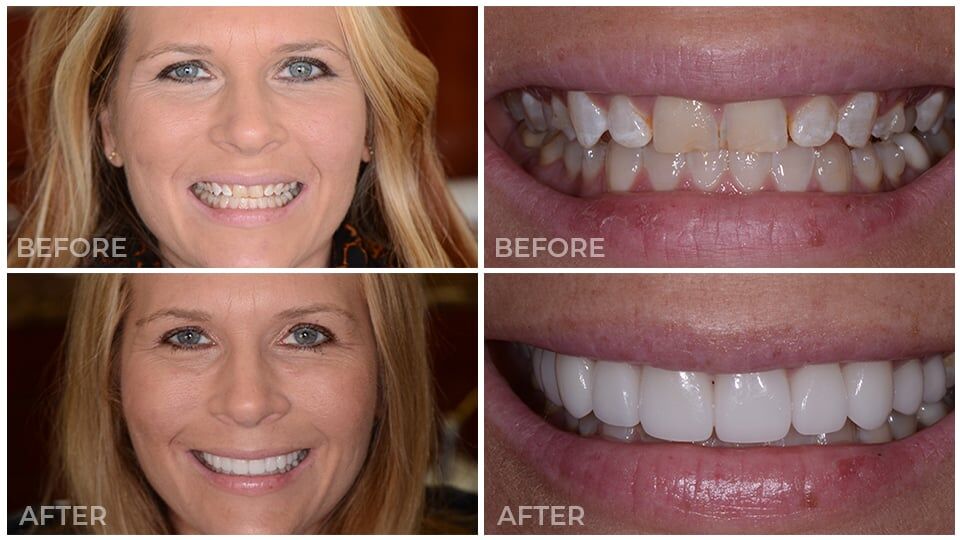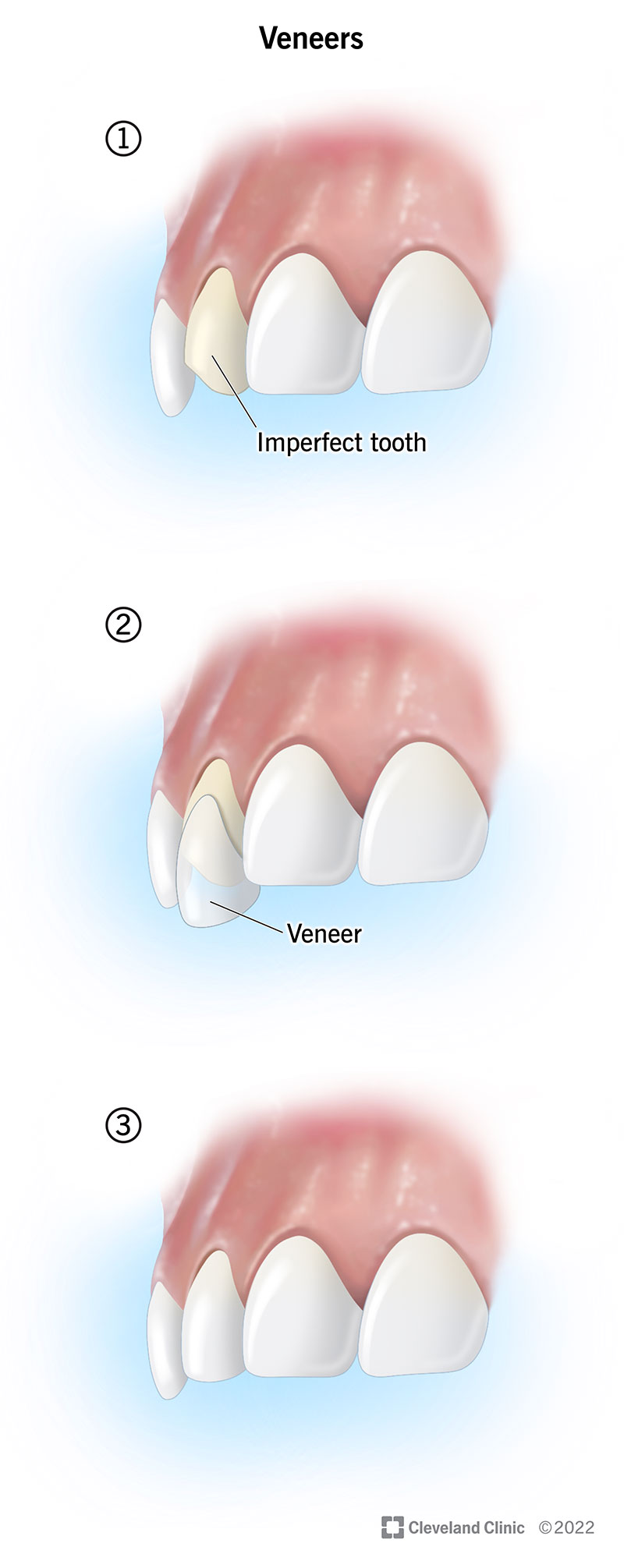Opening the Keys of Veneers: Facts, Kinds, and Advantages for a Beautiful Smile
Veneers use a compelling solution for those looking for to improve their smiles. These oral enhancements can resolve different imperfections, from discoloration to imbalance. With choices like porcelain and composite, people can pick based upon their needs and choices. Understanding the subtleties of veneers, including application and care, is necessary. What aspects should one consider prior to deciding? The responses might amaze those curious about this aesthetic oral choice.

Comprehending Veneers: What Are They?
Veneers are thin, custom-made shells made to cover the front surface of teeth, boosting their look. Usually crafted from resilient products, these shells are tailored to fit each individual's teeth precisely. They serve numerous purposes, consisting of remedying aesthetic imperfections such as discoloration, chips, or spaces. The application process includes a dentist preparing the teeth, often by getting rid of a little amount of enamel to ensure a snug fit. When prepared, the veneers are bonded to the teeth making use of a solid adhesive.
People usually choose veneers for their capability to develop a natural-looking smile while supplying a durable remedy to oral flaws. Unlike other cosmetic dentistry alternatives, veneers require marginal invasive procedures, making them a popular option. The result is an improved smile that can greatly improve a person's confidence and self-worth. Overall, veneers use a reliable method to attaining a more eye-catching and harmonious oral appearance.
Kinds of Veneers: Porcelain vs. Compound
When taking into consideration aesthetic oral choices, 2 main kinds of veneers stick out: porcelain and compound. Porcelain veneers are crafted from a durable ceramic material that simulates the natural appearance of teeth. They are understood for their stain resistance and ability to reflect light in a similar way to all-natural enamel, providing a visual charm that lots of clients need. The application process commonly involves more prep work of the tooth framework and might need multiple check outs to the dental practitioner.
On the other hand, composite veneers are made from a tooth-colored material that is straight related to the teeth. This type allows for quicker application and can frequently be finished in a single go to. While they are less costly than porcelain veneers, they may not supply the very same long life or resistance to discoloration. Ultimately, the option between porcelain and composite veneers relies on specific choices, spending plan, and specific oral demands.
The Benefits of Choosing Veneers
Picking veneers uses many benefits that can significantly enhance both the appearances and performance of a person's smile. One of the primary advantages is their ability to deal with imperfections such as discoloration, spaces, and misalignment, causing a more uniform appearance. Veneers can additionally enhance the toughness of teeth, supplying a safety layer that shields them from damage.
Moreover, they need marginal tooth preparation contrasted to other oral procedures, preserving even more of the natural tooth framework. This preservation adds to a much healthier dental environment while still achieving a spectacular smile.
Veneers are very personalized, permitting individuals to choose the shape, dimension, and color that best matches their choices. In addition, they are stain-resistant, making it less complicated to maintain a brilliant and attractive smile in time. Generally, veneers offer an effective alternative for those looking for both aesthetic improvement and long-term oral wellness benefits.
The Veneer Application Process
The veneer application procedure entails numerous vital actions to ensure ideal results. A consultation is conducted to analyze the patient's demands, complied with by the preparation and shaping of the teeth. The veneers are adhered in place, with modifications made for a perfect fit and look.
Preliminary Assessment Steps
An extensive first examination is necessary for any person taking into consideration veneers, as it establishes the structure for an effective treatment. During this meeting, the oral specialist examines the person's dental health and wellness, going over any existing problems that might influence the veneer application. This assessment may consist of X-rays and a visual examination to determine the problem of the gums and teeth.
The dental professional additionally engages the patient in a comprehensive discussion regarding their aesthetic goals, preferences, and assumptions. They might provide different veneer alternatives tailored to the patient's particular needs. Additionally, the expert explains the procedure, potential threats, and aftercare requirements, ensuring that the individual is educated and comfy prior to waging the therapy.
Prep Work and Forming Teeth
After the first appointment, the following phase involves the preparation and shaping of the teeth to fit the veneers. This vital action is performed by the dental practitioner, who thoroughly assesses the tooth structure to establish the amount of enamel that needs to be gotten rid of. Usually, a slim layer, typically around 0.5 millimeters, is cut off to guarantee an appropriate suitable for the veneers. Accuracy is paramount during this process, as it impacts both the visual outcome and the general convenience. When the teeth are appropriately formed, impressions are required to develop personalized veneers that align perfectly with the patient's oral profile. This precise prep work establishes the phase for an effective veneer application, improving both look and feature.
Bonding and Last Changes
Complying with the shaping and prep work of the teeth, the bonding procedure begins, noting an important stage in the veneer application. During this phase, a dental adhesive is applied to the ready tooth surface area, guaranteeing a solid bond in between the tooth and the veneer. The dental practitioner meticulously positions the veneer, making changes to attain the preferred placement and aesthetics. Once effectively positioned, an unique light is utilized to heal the adhesive, solidifying the bond. After curing, the dental practitioner performs last adjustments, trimming any type of excess material and improving the veneer's form to guarantee a natural look. This mindful attention to information enhances both feature and looks, adding to a general gorgeous smile that is resilient and long lasting.
Caring for Your Veneers: Upkeep Tips
Taking care of veneers is vital to preserve their appearance and durability. A constant day-to-day cleansing routine, mindful avoidance of discoloring foods, and routine oral exams are key elements of efficient upkeep. These practices assist ensure that veneers stay in peak problem and continue to boost one's smile.
Daily Cleansing Routine
Consistently maintaining veneers is vital for their durability and appearance. A correct everyday cleansing regimen can aid preserve their luster and avoid damage. Dentists suggest brushing twice a day with a soft-bristled toothbrush and fluoride tooth paste, guaranteeing that all surfaces are cleaned gently to prevent scratching the veneer surface area. Flossing day-to-day is likewise essential to eliminate food fragments and plaque from between teeth, where brushes might not reach. Additionally, using an antimicrobial mouth wash can help keep dental hygiene without hurting the veneers. It is recommended to prevent unpleasant cleansers and tools that can scrape the veneer. By following these simple actions, individuals can keep their veneers looking beautiful while promoting overall dental health and wellness.
Preventing Staining Foods
Although veneers are made to boost the look of teeth, their vulnerability to discoloring requires cautious dietary selections. It is vital for people with veneers to be mindful of particular foods and drinks that can cause discoloration. Dark-colored items such as coffee, red wine, and berry juices should be consumed in small amounts, as they are recognized to discolor both natural teeth and veneers. In addition, acidic foods like citrus fruits can damage the bonding representatives made use of in veneers, making them more vulnerable to discoloration. To preserve an intense smile, it is recommended to rinse the mouth with water after taking in discoloration foods and to practice normal oral health. These thoughtful options contribute considerably to the image source longevity and aesthetics of veneers.

Regular Dental Examinations

Maintaining the integrity of veneers requires a dedication to normal dental exams, as these appointments play an important role in guaranteeing their long life and appearance. During these gos to, oral specialists can assess the problem of discover this info here the veneers, examining for any indications of wear, damages, or underlying dental problems. Additionally, routine cleanings aid remove plaque and tartar that can build up around the veneers, advertising overall oral health and wellness. Dental experts can likewise offer tailored suggestions on care techniques and items matched for veneer maintenance. By sticking to a timetable of exams, individuals can attend to possible troubles early, ensuring their smile remains lovely and vibrant. Eventually, normal dental brows through are an essential element of veneer treatment.
Is Veneers the Right Alternative for You?
Choosing whether veneers are the right alternative commonly rests on specific dental requirements and aesthetic objectives. For those looking for to address problems such as discoloration, chips, or imbalance, veneers can provide a transformative remedy. Prospects normally include individuals with healthy and balanced teeth however desire a boosted smile.
Nonetheless, it is crucial to consider elements such as tooth enamel condition, the degree of dental concerns, and the willingness to keep veneers - What Are Veneers. Consulting with an oral professional is crucial, as they can assess oral health and figure out if veneers appropriate
In addition, possible prospects should assess the lasting commitment, as veneers might need replacement every 10-15 years. Cost considerations also play a substantial function, as veneers can be a considerable financial investment. Inevitably, the decision must be well-informed, stabilizing visual needs with practical considerations for enduring results.
Often Asked Concerns
How Much Time Do Veneers Usually Last Prior To Requiring Substitute?
Veneers normally last in between 10 to 15 years before needing substitute. Aspects such as oral hygiene, lifestyle selections, and worldly high quality can affect their durability, making regular dental check-ups vital for preserving their condition.
Are Veneers Safe for People With Sensitive Teeth?
Veneers can be secure for individuals with delicate teeth, however it often relies on the severity of sensitivity and the dental professional's method. Consulting an oral specialist before continuing is necessary to assure suitable outcomes.
Can Veneers Be Eliminated or Changed Easily?

Do Veneers Discoloration Over Time, and Exactly How Can I Prevent It?
Veneers can stain over time, particularly from foods and drinks like coffee or red a glass of wine. To stop discoloration, maintaining great oral health, using a straw for drinks, and routine dental cleanings are suggested methods.
What Is the Expense Array for Obtaining Veneers?
The price of veneers usually ranges from $500 to $2,500 per tooth, depending upon elements such as material kind, dentist experience, and place. Patients should speak with oral professionals for personalized quotes and financing alternatives.
As soon as the teeth are appropriately formed, impressions are taken to create custom-made veneers that align perfectly with the individual's dental account. During this phase, a dental adhesive is applied to the prepared tooth surface area, ensuring a strong bond in between the veneer and the tooth. It is important to take into account elements such as tooth enamel condition, the degree of dental issues, and the desire to preserve veneers. Veneers can be secure for individuals with sensitive teeth, yet look at this web-site it often depends on the seriousness of level of sensitivity and the dental expert's method. The cost of veneers typically varies from $500 to $2,500 per tooth, depending on elements such as material type, dental practitioner experience, and area.